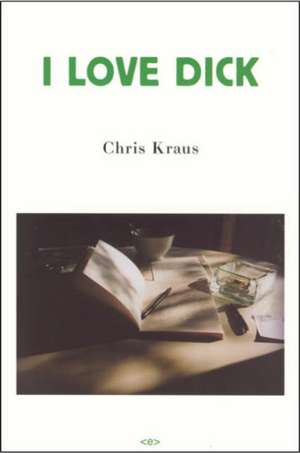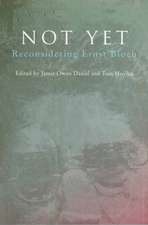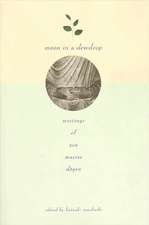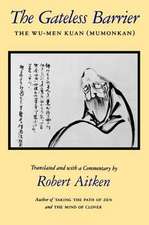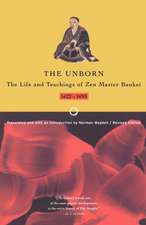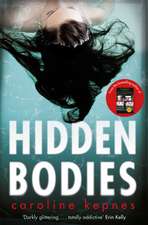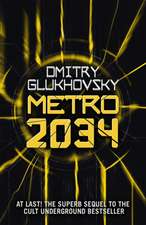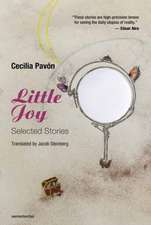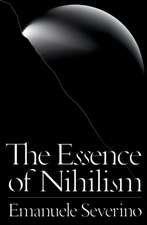I Love Dick: Semiotext(e) / Native Agents
Autor Chris Krausen Limba Engleză Paperback – 14 aug 2006
A self-described failed filmmaker falls obsessively in love with her theorist-husband's colleague: a manifesto for a new kind of feminism and the power of first-person narration.
| Toate formatele și edițiile | Preț | Express |
|---|---|---|
| Paperback (2) | 53.47 lei 3-5 săpt. | +19.61 lei 4-10 zile |
| Profile – 4 mai 2016 | 53.47 lei 3-5 săpt. | +19.61 lei 4-10 zile |
| SEMIOTEXTE – 14 aug 2006 | 99.99 lei 3-5 săpt. |
Din seria Semiotext(e) / Native Agents
-
 Preț: 83.20 lei
Preț: 83.20 lei - 11%
 Preț: 98.76 lei
Preț: 98.76 lei -
 Preț: 93.39 lei
Preț: 93.39 lei - 13%
 Preț: 84.16 lei
Preț: 84.16 lei - 14%
 Preț: 78.00 lei
Preț: 78.00 lei - 12%
 Preț: 91.11 lei
Preț: 91.11 lei -
 Preț: 101.77 lei
Preț: 101.77 lei - 15%
 Preț: 75.69 lei
Preț: 75.69 lei -
 Preț: 92.21 lei
Preț: 92.21 lei -
 Preț: 99.92 lei
Preț: 99.92 lei - 13%
 Preț: 89.06 lei
Preț: 89.06 lei - 26%
 Preț: 77.93 lei
Preț: 77.93 lei - 12%
 Preț: 92.54 lei
Preț: 92.54 lei -
 Preț: 110.63 lei
Preț: 110.63 lei - 16%
 Preț: 147.44 lei
Preț: 147.44 lei -
 Preț: 71.22 lei
Preț: 71.22 lei - 10%
 Preț: 96.18 lei
Preț: 96.18 lei -
 Preț: 86.47 lei
Preț: 86.47 lei -
 Preț: 111.96 lei
Preț: 111.96 lei -
 Preț: 76.05 lei
Preț: 76.05 lei -
 Preț: 90.72 lei
Preț: 90.72 lei - 14%
 Preț: 78.26 lei
Preț: 78.26 lei - 13%
 Preț: 73.55 lei
Preț: 73.55 lei -
 Preț: 93.81 lei
Preț: 93.81 lei -
 Preț: 92.77 lei
Preț: 92.77 lei - 14%
 Preț: 72.04 lei
Preț: 72.04 lei - 11%
 Preț: 93.20 lei
Preț: 93.20 lei -
 Preț: 103.47 lei
Preț: 103.47 lei - 14%
 Preț: 76.65 lei
Preț: 76.65 lei -
 Preț: 89.55 lei
Preț: 89.55 lei - 13%
 Preț: 83.72 lei
Preț: 83.72 lei -
 Preț: 80.61 lei
Preț: 80.61 lei - 11%
 Preț: 94.73 lei
Preț: 94.73 lei -
 Preț: 107.87 lei
Preț: 107.87 lei -
 Preț: 79.14 lei
Preț: 79.14 lei - 12%
 Preț: 91.28 lei
Preț: 91.28 lei -
 Preț: 95.46 lei
Preț: 95.46 lei -
 Preț: 146.35 lei
Preț: 146.35 lei -
 Preț: 101.65 lei
Preț: 101.65 lei -
 Preț: 87.24 lei
Preț: 87.24 lei -
 Preț: 84.21 lei
Preț: 84.21 lei - 13%
 Preț: 89.51 lei
Preț: 89.51 lei -
 Preț: 106.58 lei
Preț: 106.58 lei -
 Preț: 147.11 lei
Preț: 147.11 lei -
 Preț: 178.33 lei
Preț: 178.33 lei -
 Preț: 109.41 lei
Preț: 109.41 lei - 13%
 Preț: 84.24 lei
Preț: 84.24 lei - 13%
 Preț: 78.89 lei
Preț: 78.89 lei -
 Preț: 120.94 lei
Preț: 120.94 lei
Preț: 99.99 lei
Nou
Puncte Express: 150
Preț estimativ în valută:
19.14€ • 20.80$ • 16.09£
19.14€ • 20.80$ • 16.09£
Carte disponibilă
Livrare economică 31 martie-14 aprilie
Preluare comenzi: 021 569.72.76
Specificații
ISBN-13: 9781584350347
ISBN-10: 1584350342
Pagini: 244
Dimensiuni: 154 x 231 x 21 mm
Greutate: 0.43 kg
Editura: SEMIOTEXTE
Seria Semiotext(e) / Native Agents
Locul publicării:United States
ISBN-10: 1584350342
Pagini: 244
Dimensiuni: 154 x 231 x 21 mm
Greutate: 0.43 kg
Editura: SEMIOTEXTE
Seria Semiotext(e) / Native Agents
Locul publicării:United States
Notă biografică
Chris Kraus is the author of four novels, including I Love Dick and Summer of Hate; two books of art and cultural criticism; and most recently, After Kathy Acker: A Literary Biography. She received the College Art Association's Frank Jewett Mather Award in Art Criticism in 2008, and a Warhol Foundation Art Writing grant in 2011. She lives in Los Angeles. Eileen Myles, named by BUST magazine "the rock star of modern poetry," is the author of more than twenty books of poetry and prose, including Chelsea Girls, Cool for You, Sorry, Tree, and Not Me (Semiotext(e), 1991), and is the coeditor of The New Fuck You (Semiotext(e), 1995). Myles was head of the writing program at University of California, San Diego, from 2002 to 2007, and she has written extensively on art and writing and the cultural scene. Most recently, she received a fellowship from the Andy Warhol/Creative Capital Foundation.
Recenzii
What
I
Love
Dick
is
really
about
is
chaotic
female
sexuality
and
the
ethics
of
using
your
life
in
your
work
...
it
is
soaked
in
feminist
rage
The intelligence and honesty and total originality of Chris Kraus make her work not just great but indispensable - especially now, when everything is so confusing, so full of despair. I read everything Chris Kraus writes; she softens despair with her brightness, and with incredible humor, too.
I Love Dick is a classic. Here pain is the aphrodisiac and distance is the muse. Unrequited love is transformed into a fascinating book of ideas.
Ever since I read I Love Dick, I have revered it as one of the most explosive, revealing, lacerating and unusual memoirs ever committed to the page ... I Love Dick is never a comfortable read, and it is by turns exasperating, horrifying, and lurid, but it is never less than genuine, and often completely illuminating about the life of the mind.
I Love Dick is written in a clear prose capable of theoretical clarity, descriptive delicacy, articulate rage and melancholic longing
Tart, brazen and funny ... a cautionary tale, I Love Dick raises disturbing but compelling questions about female social behavior, power, control
For years before I read it, I kept hearing about Chris Kraus's I Love Dick. I mainly heard about it from smart women who liked to talk about their feelings ... I didn't understand exactly what it was, but it had an allure, like whispers about a dance club that only opened under the full moon, or an underground bar you needed a password to get into ... then I read it. I was nearly two decades late to the party - I Love Dick came out in 1997 - but I loved the party anyway. I was finally part of it, and it made me feel even more part of it - part of something ... I was holding white-hot text in my hands
I Love Dick is one of the most important books about being a woman ... Friends speak of Kraus's work in the same breathless and conspiratorial way they discuss Elena Ferrante's novels of female friendship set in Naples. The clandestine clubbishness that envelopes women who've read and immersed themselves in the texts shows how little female desire, anger and vulnerability is accurately and confidently explored in literature and culture ... the book reveals far deeper truths than standard and uncomplicated love plots tend to.
This is the most important book written about men and women written in the last century... why is this revolutionary 18-year-old book finding its biggest audience only now? The answer lies in its own pages, when Kraus writes that "who gets to speak, and why, is the only question". In the last half a decade, women have been permitted to speak in a different way than before; women artists who use details of their own lives in their work are not as easily dismissed as they once were. The internet enables hordes of frightened, anonymous men to try to silence women via harassment and shaming, but it has also enabled our voices to be heard on a grander scale, with fewer intermediaries, than ever before. We are able to write our own letters to Dick now, and to publish them widely: to tell Dick exactly what we think of him, whether he likes it or not.This book will only become more relevant. Its time is now - and now, and now, for the rest of eternity.
This book comes with a reputation, though it's not the one you might expect from the title, which leaps from the gorgeous, faux-innocent cover. Chris Kraus's "novel" was first published in the US in 1997 and has become recognised as both an influential feminist text and a key intervention in the debate over where life-writing ends and fiction begins ... What remains so brilliant about the book is the real, useful thought that Kraus builds out of her romantic fantasy ... You can call it a novel, then, but it's as a philosophical and cultural critique that I Love Dick bites hardest.
Read this on the bus - we dare you
One of the most important feminist novels of the past two decades -
A joyful riposte to all those stories in which clever women fall victim to the pressures of convention - from The Yellow Wallpaper to The Bell Jar and beyond - and also to the countless books by men in which women are crushed by romantic encounters: from Madame Bovary to Anna Karenina to Laclos's epistolatory Les Liaisons Dangereuses and André Breton's autofiction, Nadja ... What makes now the right moment to publish Kraus's debut novel for the first time in the UK, after 18 years? There is a hint of retrospective gratitude: without Kraus, we might not have had the philosophers in high heels of Zoe Pilger's Eat My Heart Out, or Susana Medina's Philosophical Toys. Without her challenge to what she called "the 'serious' contemporary hetero-male novel ... a thinly veiled Story of Me", Sheila Heti might never have asked How Should a Person Be?, and Ben Lerner might never have written Leaving the Atocha Station. A whole generation of writers owes her ... You can get high on the book's passion, its humour, on the creation of a still-fresh style that not only says new things about female experience, but is able simultaneously to comment, tongue-in-cheek, on how this experience has been written, filmed and made into art. Kraus writes with an elegance that includes enough rough edges to make I Love Dick a game for real. -
A literary must-have accessory, a relentlessly clever-clever book at fits neatly into the radical space recently opened up by semi-autobiographical novelists such as Nell Zink and Elena Ferrante ... It has some hugely arresting things to say about women's relationships with creative self-determination.
The skill of the book allows the reader to enter into the fantasy (the one sex scene is torturous, but hot) while knowing it's destructive and one-sided. Chris recognises how vulnerable - ridiculous even - infatuation has made her. But she glories in the surrender ... This is a brilliant, experimental rollercoaster of a book ... there's something radical about a woman who pushes herself to the edge, finally to recover.
Genre-defying and dare I say it seminal ... It has possibly even more to tell us now than it did on first publication - or perhaps we're just more ready to hear it ... I Love Dick is one of the most important books about the limited ways in which women are permitted to speak.
I Love Dick is a wonderful catalogue of contradiction and desire, which benefits from the flexible and imaginative excess of its starting point: infatuation. It's also extremely funny and frantically absorbing.
A formidable novel of ideas
As important as Mrs Dalloway or The Bell Jar
The intelligence and honesty and total originality of Chris Kraus make her work not just great but indispensable - especially now, when everything is so confusing, so full of despair. I read everything Chris Kraus writes; she softens despair with her brightness, and with incredible humor, too.
I Love Dick is a classic. Here pain is the aphrodisiac and distance is the muse. Unrequited love is transformed into a fascinating book of ideas.
Ever since I read I Love Dick, I have revered it as one of the most explosive, revealing, lacerating and unusual memoirs ever committed to the page ... I Love Dick is never a comfortable read, and it is by turns exasperating, horrifying, and lurid, but it is never less than genuine, and often completely illuminating about the life of the mind.
I Love Dick is written in a clear prose capable of theoretical clarity, descriptive delicacy, articulate rage and melancholic longing
Tart, brazen and funny ... a cautionary tale, I Love Dick raises disturbing but compelling questions about female social behavior, power, control
For years before I read it, I kept hearing about Chris Kraus's I Love Dick. I mainly heard about it from smart women who liked to talk about their feelings ... I didn't understand exactly what it was, but it had an allure, like whispers about a dance club that only opened under the full moon, or an underground bar you needed a password to get into ... then I read it. I was nearly two decades late to the party - I Love Dick came out in 1997 - but I loved the party anyway. I was finally part of it, and it made me feel even more part of it - part of something ... I was holding white-hot text in my hands
I Love Dick is one of the most important books about being a woman ... Friends speak of Kraus's work in the same breathless and conspiratorial way they discuss Elena Ferrante's novels of female friendship set in Naples. The clandestine clubbishness that envelopes women who've read and immersed themselves in the texts shows how little female desire, anger and vulnerability is accurately and confidently explored in literature and culture ... the book reveals far deeper truths than standard and uncomplicated love plots tend to.
This is the most important book written about men and women written in the last century... why is this revolutionary 18-year-old book finding its biggest audience only now? The answer lies in its own pages, when Kraus writes that "who gets to speak, and why, is the only question". In the last half a decade, women have been permitted to speak in a different way than before; women artists who use details of their own lives in their work are not as easily dismissed as they once were. The internet enables hordes of frightened, anonymous men to try to silence women via harassment and shaming, but it has also enabled our voices to be heard on a grander scale, with fewer intermediaries, than ever before. We are able to write our own letters to Dick now, and to publish them widely: to tell Dick exactly what we think of him, whether he likes it or not.This book will only become more relevant. Its time is now - and now, and now, for the rest of eternity.
This book comes with a reputation, though it's not the one you might expect from the title, which leaps from the gorgeous, faux-innocent cover. Chris Kraus's "novel" was first published in the US in 1997 and has become recognised as both an influential feminist text and a key intervention in the debate over where life-writing ends and fiction begins ... What remains so brilliant about the book is the real, useful thought that Kraus builds out of her romantic fantasy ... You can call it a novel, then, but it's as a philosophical and cultural critique that I Love Dick bites hardest.
Read this on the bus - we dare you
One of the most important feminist novels of the past two decades -
A joyful riposte to all those stories in which clever women fall victim to the pressures of convention - from The Yellow Wallpaper to The Bell Jar and beyond - and also to the countless books by men in which women are crushed by romantic encounters: from Madame Bovary to Anna Karenina to Laclos's epistolatory Les Liaisons Dangereuses and André Breton's autofiction, Nadja ... What makes now the right moment to publish Kraus's debut novel for the first time in the UK, after 18 years? There is a hint of retrospective gratitude: without Kraus, we might not have had the philosophers in high heels of Zoe Pilger's Eat My Heart Out, or Susana Medina's Philosophical Toys. Without her challenge to what she called "the 'serious' contemporary hetero-male novel ... a thinly veiled Story of Me", Sheila Heti might never have asked How Should a Person Be?, and Ben Lerner might never have written Leaving the Atocha Station. A whole generation of writers owes her ... You can get high on the book's passion, its humour, on the creation of a still-fresh style that not only says new things about female experience, but is able simultaneously to comment, tongue-in-cheek, on how this experience has been written, filmed and made into art. Kraus writes with an elegance that includes enough rough edges to make I Love Dick a game for real. -
A literary must-have accessory, a relentlessly clever-clever book at fits neatly into the radical space recently opened up by semi-autobiographical novelists such as Nell Zink and Elena Ferrante ... It has some hugely arresting things to say about women's relationships with creative self-determination.
The skill of the book allows the reader to enter into the fantasy (the one sex scene is torturous, but hot) while knowing it's destructive and one-sided. Chris recognises how vulnerable - ridiculous even - infatuation has made her. But she glories in the surrender ... This is a brilliant, experimental rollercoaster of a book ... there's something radical about a woman who pushes herself to the edge, finally to recover.
Genre-defying and dare I say it seminal ... It has possibly even more to tell us now than it did on first publication - or perhaps we're just more ready to hear it ... I Love Dick is one of the most important books about the limited ways in which women are permitted to speak.
I Love Dick is a wonderful catalogue of contradiction and desire, which benefits from the flexible and imaginative excess of its starting point: infatuation. It's also extremely funny and frantically absorbing.
A formidable novel of ideas
As important as Mrs Dalloway or The Bell Jar
